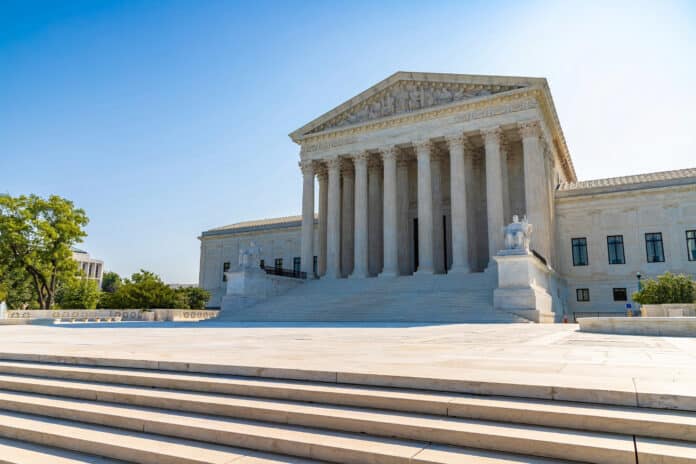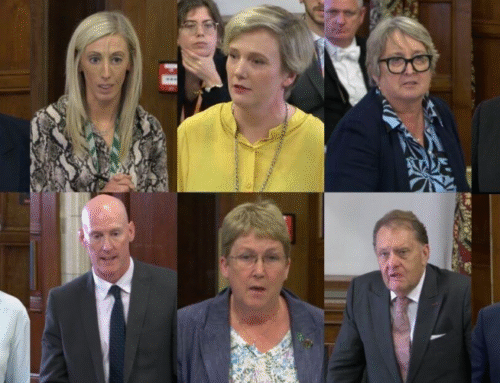(The Center Square) – The U.S. Supreme Court has released a string of landmark rulings recently, from sending the abortion issue back to the states to granting a measure of presidential immunity to the overturning of Chevron deference, significantly weakening federal rulemaking power.
Supreme Court terms begin and end in October, and heading into the new year there are major cases awaiting.
Here are five of the biggest cases in which the Supreme Court is expected to weigh in by the end of this term:
TikTok ban
Many lawmakers and national security experts have raised concerns about the invasive software attached to TikTok, a hugely popular entertainment app that reportedly has about 150 million active users.
China is the parent company for the app and has access to millions of Americans’ personal data through the TikTok software, which is unusually invasive and collects much more personal data on its users than other similar apps.
President Joe Biden signed into law a ban on the app unless it is sold to a U.S. company, citing these concerns.
While that ban had bipartisan support, President-elect Donald Trump weighed in on the case this week, asking the Supreme Court to delay the ban from going into effect.
“In light of these interests—including, most importantly, his overarching responsibility for the United States’ national security and foreign policy—President Trump opposes banning TikTok in the United States at this juncture, and seeks the ability to resolve the issues at hand through political means once he takes office,” Trump’s lawyer said in a brief filed with the court.
During the presidential campaign, Trump promised to “save TikTok.”
“Furthermore, President Trump alone possesses the consummate dealmaking expertise, the electoral mandate, and the political will to negotiate a resolution to save the platform while addressing the national security concerns expressed by the Government—concerns which President Trump himself has acknowledged,” the brief read.
Transgender surgeries for minors
The Supreme Court heard oral arguments last fall in United States v. Skrmetti, a case that considers the constitutionality of a Tennessee bill that bans transgender surgeries and hormones for minors.
Those medical procedures have become increasingly controversial since they can sterilize the recipients and are sometimes later regretted when the children come of age.
The Supreme Court ruling could kill or encourage similar efforts in states around the country.
Ghost guns
In Garland v. VanDerStok, the Bureau of Alcohol, Tobacco, Firearms, and Explosives faces a legal challenge to its Biden-era rule attempting to block “ghost guns,” firearms without serial numbers that can be 3-D printed or put together by someone who acquires individual parts.
In particular, kits can be bought online that allow buyers to assemble a weapon. The case in question will require the justices to determine whether a disassembled kit of firearm parts is still considered a “firearm” and therefore subject to federal rules, especially rules requiring a serial number.
During oral arguments last fall, justices seemed skeptical of the legal challenge to the federal rule.
Age verification for pornography
The Supreme Court is expected to hear oral arguments Jan. 15 in Free Speech Coalition v. Paxton, a legal challenge to a Texas law requiring pornography sites to use age verification to prevent minors from seeing their pornographic content.
Critics have cited free speech concerns while proponents of the law have pointed out that there is legal precedent for age verification which is required for other products like alcohol and tobacco and has been required to view R-rated movies in theaters.
Pornography sites have pushed back on the law, which has been adopted in a similar fashion in about 20 Republican states around the country.
“Let me put this simply: these companies do not have a right to expose children to pornography,” Texas Attorney General Ken Paxton said in a statement. “Texas has a clear interest in protecting children, and we have been successful defending this commonsense age verification law against a powerful global industry.”
Environmental impact
The Supreme Court in December heard oral arguments in Seven County Infrastructure Coalition v. Eagle County, a case where justices will consider just how expansive the environmental constraints can become on federal agency actions.
Under the National Environmental Policy Act, federal agencies are required to assess the “foreseeable impact” on the environment of their actions.
However, just how broad that assessment must be is up for consideration.
Subscribe Below To Our Weekly Newsletter of our Latest Videos and Receive a Discount Code For A FREE eBook from our eBook store:






